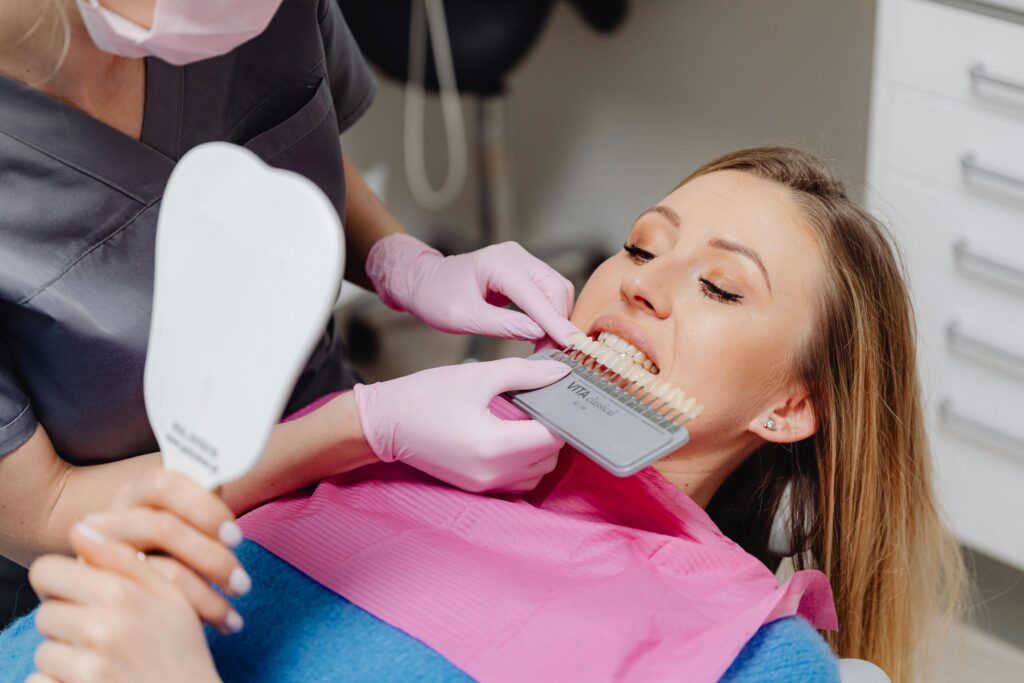
After a tooth extraction, it’s important to eat carefully to heal well and feel less pain. This guide will help you understand when and what to eat after your tooth extraction.
Immediate Aftercare (First 24 Hours)
1. Stick to Liquids and Soft Foods:
-Clear Liquids: Drink only clear liquids like water, herbal tea, and clear broths. Avoid hot drinks that might cause bleeding or discomfort.
-Smoothies: Choose smoothies that are smooth and seed-free to avoid any discomfort at the extraction site.
2. Avoid Hot Foods and Beverages:
-Cool or Room Temperature Foods: Hot foods and drinks can harm the healing process. Stick to cool or room temperature options like chilled soups or soft-serve ice cream.
-Ice Cream and Yogurt: These are soothing and easy to eat, but avoid any with nuts or candy pieces.
First Few Days (24-48 Hours)
1. Gradually Introduce Semi-Solid Foods:
-Yogurt and Pudding: These are easy to eat and won’t disturb the extraction site.
-Mashed Potatoes: Make sure they’re smooth and not too hot. Adding gravy or butter can make them easier to swallow.
2. Hydrate Well:
-Avoid Straws: Drinking through a straw can dislodge the blood clot and cause pain.
-Soups and Broths: Choose smooth soups without chunks of meat or vegetables. Strain them to remove any solid particles.
Moving Towards Solid Foods (48-72 Hours)
1. Soft Solid Foods:
-Scrambled Eggs: Scrambled eggs are soft, easy to chew, and a good source of protein.
-Pasta: Cook pasta until very soft and serve with a mild sauce for a comfortable meal.
2. Monitor Your Comfort Level:
-Pain and Swelling: If you feel more pain or swelling, go back to softer foods and talk to your dentist.
-Chewing Side: Chew on the opposite side of your mouth to avoid irritating the extraction site.
Full Return to Solid Foods (One Week and Beyond)
1. Gradual Transition:
-Easy to Chew Foods: Start with foods like tender chicken, steamed vegetables, and soft bread.
-Avoid Hard, Crunchy Foods: Stay away from nuts, chips, and raw vegetables until your extraction site heals fully.
2. Maintain Oral Hygiene:
-Gentle Rinsing: Rinse your mouth with a saltwater solution after meals to keep it clean.
-Avoid Vigorous Rinsing or Spitting: These actions can harm the healing process.
Special Considerations When Can I Eat Solid Food After Tooth Extraction
1. Multiple Extractions or Complicated Procedures:
-Customized Diet Plan: Your dentist may give you specific dietary advice if you had multiple teeth extracted or a complex procedure.
2. Signs of Complications:
-Seek Immediate Help: Call your dentist if you have severe pain, bleeding that doesn’t stop, swelling that gets worse, or signs of infection.
Final Thoughts for When Can I Eat Solid Food After Tooth Extraction?
Following your dentist’s advice and the general timeline is key to a smooth recovery. Each person heals differently, so pay attention to your body. If you have concerns, talk to your dentist.
After a tooth extraction, the journey to recovery is crucial. Understanding when you can eat solid food plays a significant role in this process. It’s essential to listen to your body and follow the advice of dental professionals.
Remember that soft foods are vital initially. They help prevent irritation at the extraction site while providing necessary nutrients for healing. Gradually reintroducing solids ensures comfort and promotes proper recovery.
If discomfort arises while eating, consult with your dentist for tailored recommendations. Their guidance will be invaluable as you navigate through different stages of healing.
Always prioritize hydration and nutrition during this time. It enhances your overall well-being and supports faster recuperation.
Should you have any lingering questions or concerns, don’t hesitate to seek out additional resources or contact healthcare professionals for support. Your health matters most throughout this experience.
Good aftercare is vital to prevent problems and aid healing. This lets you get back to your normal diet quickly and comfortably.